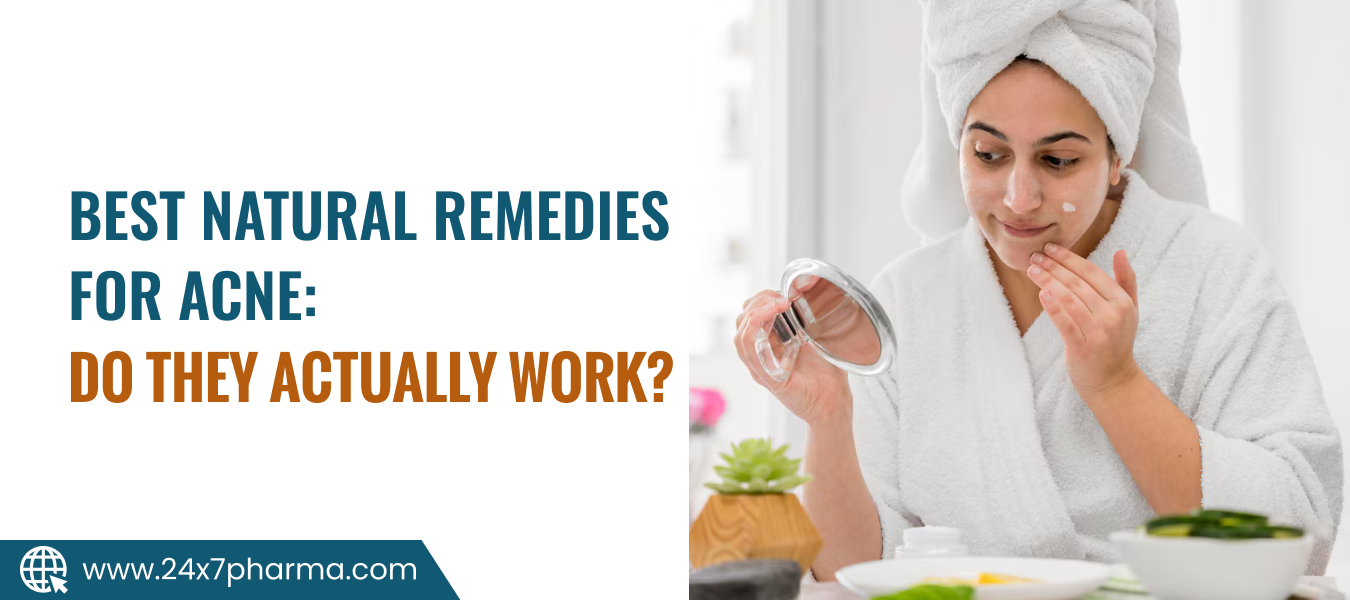Acne is a common skin concern that affects millions worldwide, cutting across age groups, skin types, and lifestyles. As over-the-counter treatments and prescriptions come with side effects or high costs, many individuals are turning to natural acne products and organic pimple treatments in hopes of achieving clearer skin. But the question remains—do these natural skincare for acne solutions actually work? This article explores popular organic acne treatments, supported by scientific evidence and dermatologist insights, to help you make informed skincare decisions.
Do Natural Remedies Actually Work for Acne?
Yes, some natural remedies for acne can be effective—but results vary. Ingredients like tea tree oil, aloe vera, and green tea extract have demonstrated anti-inflammatory and antibacterial properties. However, not all natural face care for acne is equally safe or scientifically proven. Dermatologists suggest using natural acne remedies as complementary care, not a sole solution.
Most Popular Natural Remedies for Acne (And What Science Says)
1. Tea Tree Oil
Tea tree oil is one of the most widely studied natural acne products. It possesses powerful antibacterial properties that can help kill acne-causing bacteria like Propionibacterium acnes. Clinical trials suggest that a 5% tea tree oil gel can reduce mild to moderate acne as effectively as benzoyl peroxide, with fewer side effects such as dryness or irritation.
Caution: Always dilute tea tree oil with a carrier oil like jojoba oil to prevent skin irritation.
2. Aloe Vera
Known for its soothing and moisturizing properties, aloe vera also contains salicylic acid and sulfur, both effective in treating acne. Applying fresh aloe vera gel can reduce redness and swelling, especially when used alongside topical medications.
Best For: Sensitive skin types needing gentle, organic pimple treatment.
3. Green Tea Extract
Rich in antioxidants, green tea—especially its epigallocatechin gallate (EGCG) content—can reduce sebum production and inflammation. Studies show that topical application of green tea extract can significantly decrease acne lesions and oiliness.
Pro Tip: Use cooled brewed green tea as a toner or look for natural skin products for acne containing EGCG.
4. Apple Cider Vinegar (ACV)
Apple cider vinegar has antimicrobial properties, making it a popular DIY toner. It helps exfoliate dead skin cells and balance skin pH. However, its high acidity can cause burns or irritation if not diluted properly.
Warning: Patch-test before using, and always dilute with water (1 part ACV to 3 parts water).
5. Honey and Cinnamon Mask
Both honey and cinnamon offer antibacterial and anti-inflammatory effects. Together, they create a nourishing face mask that may help reduce redness and acne-causing bacteria. Raw or manuka honey is the best option for this treatment.
Usage: Apply for 10–15 minutes, once or twice a week for natural pimple treatment for oily skin.
6. Zinc Supplements
Zinc plays a role in skin healing and reducing inflammation. Oral zinc supplements have been shown to help decrease the severity of acne, particularly for individuals with a deficiency. Topical zinc is also available, though results are mixed.
Consultation Tip: Speak to a healthcare provider before beginning any regimen involving supplements for acne.
7. Other Natural Supplements for Acne
In addition to zinc, natural supplements for acne like omega-3 fatty acids, probiotics, and vitamin A may support skin health. These best dietary supplements for acne can help reduce inflammation and hormonal imbalance that contributes to breakouts.
Myths vs. Facts About Natural Acne Remedies
- Myth: Lemon juice clears acne overnight.
- Fact: Lemon juice is too acidic and can cause skin irritation or burns.
- Myth: Natural remedies are always safe.
- Fact: Some natural products can cause allergic reactions or worsen skin issues.
- Myth: More is better.
- Fact: Overusing remedies like tea tree oil can irritate the skin and delay healing.
What Dermatologists Say About Going Natural
According to dermatologists from the American Academy of Dermatology (AAD), while some natural skincare for acne treatments show promise, they should not replace evidence-based medical care—especially for severe or cystic acne. Combining natural face care for acne with dermatologist-recommended treatments often yields the best results.
Dr. Amy Lee, a board-certified dermatologist, notes, “Natural doesn’t always mean better. It’s essential to understand your skin’s needs and test carefully before incorporating natural acne remedies into your routine.”
Read More : The Ultimate Acne Guide: Causes, Treatments & Prevention
Final Verdict: Are Natural Remedies Worth It?
Natural acne products can offer gentle, cost-effective ways to manage mild acne. Ingredients like tea tree oil, aloe vera, and green tea have scientific backing and user testimonials to support their benefits. However, their success often depends on consistent use, correct formulation, and individual skin types.
If you’re considering organic acne treatment, start slow, patch-test, and consult a dermatologist for personalized advice. Clear skin is a journey, and the right mix of nature and science might just be your winning formula.
FAQs
1.What is the safest natural remedy for acne?
A: Aloe vera is considered one of the safest due to its soothing, non-comedogenic nature.
2.Can natural remedies make acne worse?
A: Yes, especially if used improperly or without dilution. Always patch-test first.
3.Are there dermatologist-approved natural treatments?
A: Yes. Tea tree oil, green tea, and zinc have received positive attention from skincare professionals.

